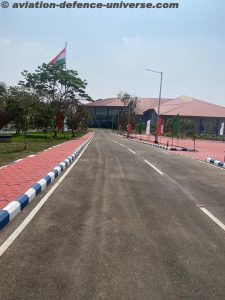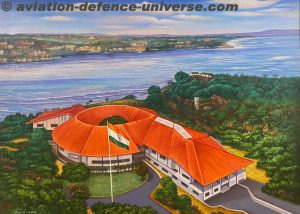 New Delhi. 04 March 2024. Defence Minister Rajnath Singh will inaugurate the new State-of-the-Art Admin-cum-Training building of the Naval War College at Goa on 05 Mar 24. The modern edifice is named the ‘Chola’ in commemoration of the mighty maritime empire of the Chola dynasty.
New Delhi. 04 March 2024. Defence Minister Rajnath Singh will inaugurate the new State-of-the-Art Admin-cum-Training building of the Naval War College at Goa on 05 Mar 24. The modern edifice is named the ‘Chola’ in commemoration of the mighty maritime empire of the Chola dynasty.
History of Naval War College
The College of Naval Warfare was initially established at INS Karanja in 1988 to impart advanced professional military education to the middle and senior level officers of the Bharatiya Nausena. The college was rechristened as the Naval War College in 2010 and was shifted to its current location in Goa in 2011. With the vision of being the pre-eminent iconic institution for higher military education, the mission of the college is to prepare the officers of the Armed Forces for leadership at the strategic and operational levels. The college also conducts the Maritime Security Course wherein military officers from our maritime neighbourhood also participate and collaborate to foster an open, secure and inclusive Indian Ocean Region that reflects our Hon’ble Prime Minister’s vision of ‘SAGAR’. The Naval War College is also the Centre of Excellence of the Indian Navy for Wargaming and Arctic Studies.
The ‘Chola’ Building
The building of the Naval War College for academic instruction, research and wargaming is inspired by the Chola dynasty’s maritime prowess. The central foyer of the structure features a tiled mural that depicts Rajendra Chola’s expedition to the Srivijaya Empire across the high seas of the Indian Ocean in 1025 CE. The building’s name bridges the past to the present by illuminating India’s maritime influence in the past and its resurgence as a maritime power in the present.
 The building has been constructed in accordance with the GRIHA-III norms. The key features of the building include: in-house utilisation of excavated soil for environmental development initiatives; rainwater harvesting capacity of over 10 lakh litres; 100KW solar power generation; and green building standards. The aspects of sustainability and energy efficiency form the core of the building’s design engineering philosophy, best exemplified by construction of the building around a 100 year old Banyan tree without uprooting it.
The building has been constructed in accordance with the GRIHA-III norms. The key features of the building include: in-house utilisation of excavated soil for environmental development initiatives; rainwater harvesting capacity of over 10 lakh litres; 100KW solar power generation; and green building standards. The aspects of sustainability and energy efficiency form the core of the building’s design engineering philosophy, best exemplified by construction of the building around a 100 year old Banyan tree without uprooting it.
Symbolically, the building overlooks the colonial fort of the Portuguese at Reis Magos. This apt location epitomizes India’s resolve to shed the vestiges of the colonial past. In addition, it serves as an apt reminder to future military leaders of the continued value of Chhatrapati Shivaji’s unequivocal belief in the adage ‘Jalameva Yasya, Balameva Tasya’ (He who controls the sea is all powerful).




































































































































